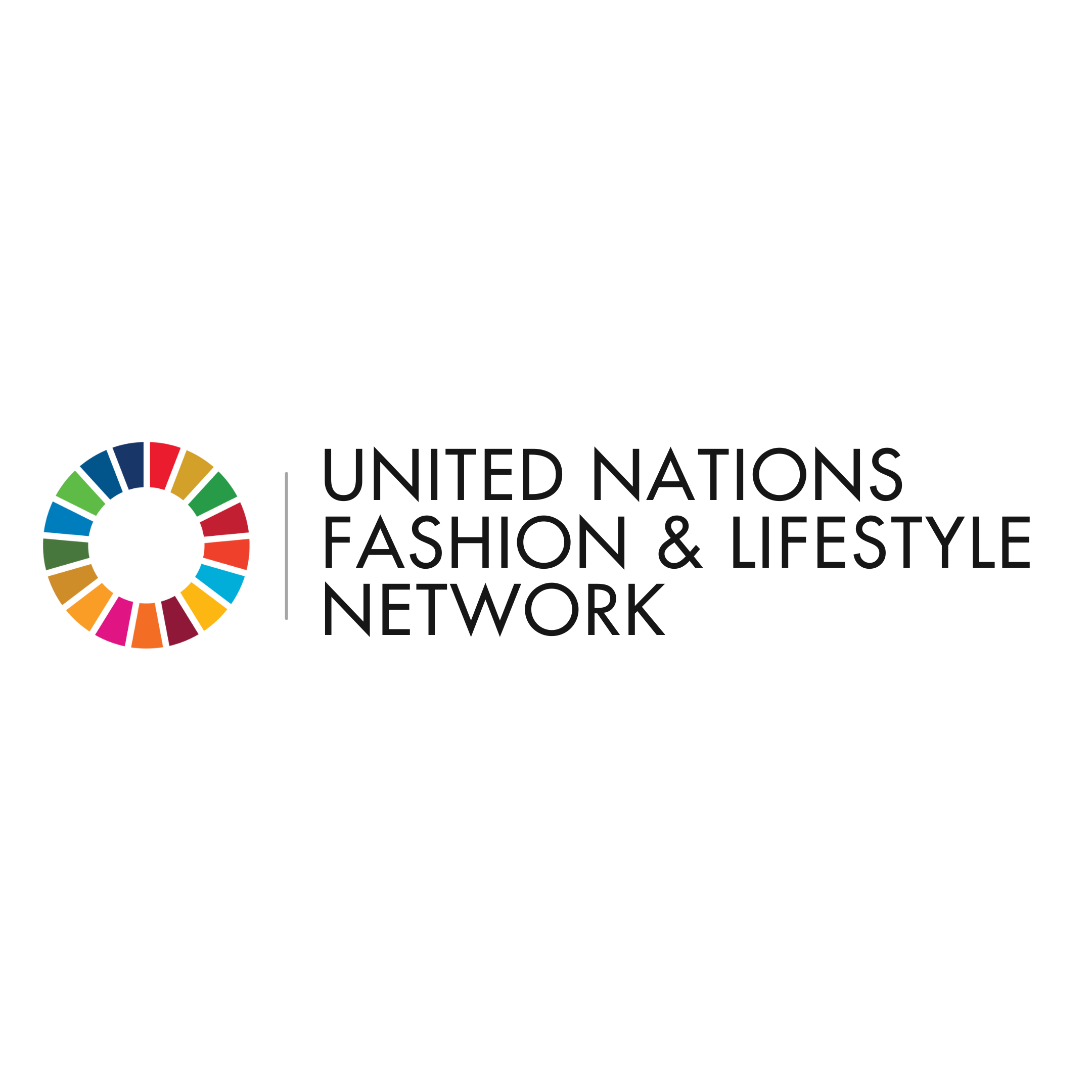Conscious Fashion Campaign: New York Fashion Week September 2022
Conscious Fashion Campaign
(
Partnership
)
#SDGAction48068
Description
The Conscious Fashion Campaign, an initiative of the Fashion Impact Fund in collaboration with the United Nations Office for Partnerships and the PVBLIC Foundation, spotlight women entrepreneurs advancing fashion industry change on digital billboards. With women receiving only 25% of news features globally [Global Media Monitoring Project 2020 - 2021 Final Report], the campaign amplifies the visibility and increases media representation of women entrepreneurs leading the fashion sector towards a responsible future. The Conscious Fashion Campaign: New York Fashion Week September 2022 edition showcased ten women-led organizations advancing fashion industry change in a collective digital billboard campaign September 9 - 14, 2022 during New York Fashion Week.
The Conscious Fashion Campaign amplifies the visibility of fashion-focused women social entrepreneurs to educate, inform and inspire as they lead the industry towards an inclusive and responsible future. The initiative followed this timeline: May 2, 2022: Open for applications. June 5, 2022: Application deadline. June 10 - July 1, 2022: Selection process by Advisory Committee. July 25, 2022: Ten honorees announced. August 2022: Creative preparation. September 9 - 14, 2022: Honorees were showcased in a collective billboard campaign during New York Fashion Week.
With its existing partners, the Conscious Fashion Campaign will continue to champion women social entrepreneurs transforming fashion globally and to elevate the Sustainable Development Goals. The campaign will accelerate digital campaigns to drive a diverse advertising media landscape; specifically with a focus on highlighting female trailblazers in the fashion sector as they shape industry and society with innovative solutions.
The Conscious Fashion Campaign: New York Fashion Week September 2022 is managed by the leadership team at the Fashion Impact Fund and receives support from the United Nations Office for Partnership and the PVBLIC Foundation. An advisory committee of leading media representatives and conscious fashion advocates reviewed the applications and selected honorees based on factors including supporting the advancement of at least one Sustainable Development Goal, the innovations, solutions or sustainable business practices they have implemented to support social, environmental and/or economic impact within the industry and their contribution as a driving force for sustainable development in the fashion ecosystem. This Conscious Fashion Campaign: New York Fashion Week September 2022 was open globally to women social entrepreneurs, aged 18+, who are transforming fashion by supporting the advancement of at least one Sustainable Development Goal. Applicants were evaluated by the innovations, solutions, or sustainable business practices they have implemented to support social, environmental and/or economic impact within the industry. Throughout the application, candidates were required to clearly identify their contribution as a driving force for sustainable development in the fashion ecosystem. Ten honorees were been chosen by the Advisory Committee to be showcased in a collective billboard campaign during New York Fashion Week. Conscious Fashion Campaign: New York Fashion Week September 2022 advisory committee members included Paloma Costa, Member - United Nations Secretary-General's Youth Advisory Group on Climate Change, Noëlla Coursaris Musunka, Founder and CEO Malaika, Tara Donaldson, Executive Editor WWD, Julia Gall, Freelance Fashion Stylist Writer and Consultant, Mary Gehlhar, Fashion Educator and Author, The Fashion Designer Survival Guide, Femi Oke, Senior Host and Journalist, Al Jazeera, Fernanda Simon, Sustainability Editor, Vogue Brazil and Director, Fashion Revolution Brazil, and Ariana Stolarz, Managing Director, Global Sustainability Lead x Product Innovation, Accenture.
Fashion Impact Fund, PVBLIC Foundation, United Nations Office for Partnerships
SDGS & Targets
Goal 5
Achieve gender equality and empower all women and girls
5.1
End all forms of discrimination against all women and girls everywhere
5.1.1
Whether or not legal frameworks are in place to promote, enforce and monitor equality and non‑discrimination on the basis of sex
5.2
5.2.1
Proportion of ever-partnered women and girls aged 15 years and older subjected to physical, sexual or psychological violence by a current or former intimate partner in the previous 12 months, by form of violence and by age
5.2.2
Proportion of women and girls aged 15 years and older subjected to sexual violence by persons other than an intimate partner in the previous 12 months, by age and place of occurrence
5.3
5.3.1
Proportion of women aged 20-24 years who were married or in a union before age 15 and before age 18
5.3.2
Proportion of girls and women aged 15-49 years who have undergone female genital mutilation/cutting, by age
5.4
Recognize and value unpaid care and domestic work through the provision of public services, infrastructure and social protection policies and the promotion of shared responsibility within the household and the family as nationally appropriate
5.4.1
Proportion of time spent on unpaid domestic and care work, by sex, age and location
5.5
Ensure women’s full and effective participation and equal opportunities for leadership at all levels of decision-making in political, economic and public life
5.5.1
Proportion of seats held by women in (a) national parliaments and (b) local governments
5.5.2
Proportion of women in managerial positions
5.6
Ensure universal access to sexual and reproductive health and reproductive rights as agreed in accordance with the Programme of Action of the International Conference on Population and Development and the Beijing Platform for Action and the outcome documents of their review conferences
5.6.1
Proportion of women aged 15-49 years who make their own informed decisions regarding sexual relations, contraceptive use and reproductive health care
5.6.2
Number of countries with laws and regulations that guarantee full and equal access to women and men aged 15 years and older to sexual and reproductive health care, information and education
5.a
Undertake reforms to give women equal rights to economic resources, as well as access to ownership and control over land and other forms of property, financial services, inheritance and natural resources, in accordance with national laws
5.a.1
(a) Proportion of total agricultural population with ownership or secure rights over agricultural land, by sex; and (b) share of women among owners or rights-bearers of agricultural land, by type of tenure
5.a.2
Proportion of countries where the legal framework (including customary law) guarantees women’s equal rights to land ownership and/or control
5.b
5.b.1
Proportion of individuals who own a mobile telephone, by sex
5.c
Adopt and strengthen sound policies and enforceable legislation for the promotion of gender equality and the empowerment of all women and girls at all levels
5.c.1
Proportion of countries with systems to track and make public allocations for gender equality and women’s empowerment
Goal 17
Strengthen the means of implementation and revitalize the Global Partnership for Sustainable Development
17.1
Strengthen domestic resource mobilization, including through international support to developing countries, to improve domestic capacity for tax and other revenue collection
17.1.1
17.1.2
17.2
Developed countries to implement fully their official development assistance commitments, including the commitment by many developed countries to achieve the target of 0.7 per cent of ODA/GNI to developing countries and 0.15 to 0.20 per cent of ODA/GNI to least developed countries; ODA providers are encouraged to consider setting a target to provide at least 0.20 per cent of ODA/GNI to least developed countries
17.2.1
17.3
Mobilize additional financial resources for developing countries from multiple sources
17.3.1
Additional financial resources mobilized for developing countries from multiple sources
17.3.2
17.4
Assist developing countries in attaining long-term debt sustainability through coordinated policies aimed at fostering debt financing, debt relief and debt restructuring, as appropriate, and address the external debt of highly indebted poor countries to reduce debt distress
17.4.1
Debt service as a proportion of exports of goods, services and primary income
17.5
Adopt and implement investment promotion regimes for least developed countries
17.5.1
Number of countries that adopt and implement investment promotion regimes for developing countries, including the least developed countries
17.6
Enhance North-South, South-South and triangular regional and international cooperation on and access to science, technology and innovation and enhance knowledge sharing on mutually agreed terms, including through improved coordination among existing mechanisms, in particular at the United Nations level, and through a global technology facilitation mechanism
17.6.1
Fixed broadband subscriptions per 100 inhabitants, by speed
17.7
Promote the development, transfer, dissemination and diffusion of environmentally sound technologies to developing countries on favourable terms, including on concessional and preferential terms, as mutually agreed
17.7.1
Total amount of funding for developing and developed countries to promote the development, transfer, dissemination and diffusion of environmentally sound technologies
17.8
Fully operationalize the technology bank and science, technology and innovation capacity-building mechanism for least developed countries by 2017 and enhance the use of enabling technology, in particular information and communications technology
17.8.1
17.9
Enhance international support for implementing effective and targeted capacity-building in developing countries to support national plans to implement all the Sustainable Development Goals, including through North-South, South-South and triangular cooperation
17.9.1
Dollar value of official development assistance committed to developing countries
17.10
Promote a universal, rules-based, open, non-discriminatory and equitable multilateral trading system under the World Trade Organization, including through the conclusion of negotiations under its Doha Development Agenda
17.10.1
17.11
Significantly increase the exports of developing countries, in particular with a view to doubling the least developed countries’ share of global exports by 2020
17.11.1
Developing countries’ and least developed countries’ share of global exports
17.12
Realize timely implementation of duty-free and quota-free market access on a lasting basis for all least developed countries, consistent with World Trade Organization decisions, including by ensuring that preferential rules of origin applicable to imports from least developed countries are transparent and simple, and contribute to facilitating market access
17.12.1
Weighted average tariffs faced by developing countries, least developed countries and small island developing States
17.13
Enhance global macroeconomic stability, including through policy coordination and policy coherence
17.13.1
17.14
Enhance policy coherence for sustainable development
17.14.1
17.15
Respect each country’s policy space and leadership to establish and implement policies for poverty eradication and sustainable development
17.15.1
17.16
Enhance the Global Partnership for Sustainable Development, complemented by multi-stakeholder partnerships that mobilize and share knowledge, expertise, technology and financial resources, to support the achievement of the Sustainable Development Goals in all countries, in particular developing countries
17.16.1
Number of countries reporting progress in multi-stakeholder development effectiveness monitoring frameworks that support the achievement of the Sustainable Development Goals
17.17
Encourage and promote effective public, public-private and civil society partnerships, building on the experience and resourcing strategies of partnerships
17.17.1
Amount in United States dollars committed to public-private partnerships for infrastructure
17.18
By 2020, enhance capacity-building support to developing countries, including for least developed countries and small island developing States, to increase significantly the availability of high-quality, timely and reliable data disaggregated by income, gender, age, race, ethnicity, migratory status, disability, geographic location and other characteristics relevant in national contexts
17.18.1
Statistical capacity indicators
17.18.2
17.18.3
Number of countries with a national statistical plan that is fully funded and under implementation, by source of funding
17.19
By 2030, build on existing initiatives to develop measurements of progress on sustainable development that complement gross domestic product, and support statistical capacity-building in developing countries
17.19.1
17.19.2
Proportion of countries that (a) have conducted at least one population and housing census in the last 10 years; and (b) have achieved 100 per cent birth registration and 80 per cent death registration
SDG 14 targets covered
Deliverables & Timeline
Showcase 10 women-led fashion organizations driving social and environmental impact on collective billboard campaign in New York City
Resources mobilized
Partnership Progress


Feedback
Action Network

Timeline
Entity
Geographical coverage
Other beneficiaries
Teju Adisa-Farrar, Environmental Equity Consultant and Independent Researcher; Alissa Baier-Lentz,Co-Founder and COO, Kintra Fibers; Tamburai Chirume, Co-Founder and MD, The African Academy of Fashion est by ONEOFEACH; Victoria Jenkins, Founder and CEO, Unhidden; Nkwo Onwuka, Founder and Creative Director, NKWO TRANSFORM; Josephine Philips, Founder and CEO, Sojo; Madhu Vaishnav, Founder, Saheli Women; Rebecca van Bergen, Founder and Executive Director, Nest; Nancy Volpe Beringer, Founder and Fashion Designer, The Vault by Volpe Beringer; Sophia Wang, Co-Founder and Chief of Culture, MycoWorks.
Photos

More information
Countries
Contact Information
Kerry Bannigan , Executive Director, Fashion Impact Fund

